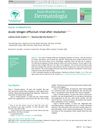 144 citations,
March 2013 in “Circulation Research”
144 citations,
March 2013 in “Circulation Research” K_ATP channel gene mutations are linked to heart diseases, but more research is needed to understand the connection and treatment potential.
[object Object]  7 citations,
April 2012 in “Biomolecular concepts”
7 citations,
April 2012 in “Biomolecular concepts” Keratin is crucial for keeping skin cells healthy and its changes can lead to diseases and affect cell behavior.
 6 citations,
May 2017 in “InTech eBooks”
6 citations,
May 2017 in “InTech eBooks” Hair loss can cause serious mental health problems and treating it requires a team of experts.
 3 citations,
November 2016 in “Clinical Pediatrics”
3 citations,
November 2016 in “Clinical Pediatrics” A girl with Crohn's disease developed hair loss from her medication, which improved with treatment but later returned.
 1 citations,
January 2021 in “Dermatologic Therapy”
1 citations,
January 2021 in “Dermatologic Therapy” Trichobiolight effectively treats hair loss with 82.5% success.
 41 citations,
March 1992 in “Archives of Dermatology”
41 citations,
March 1992 in “Archives of Dermatology” The review suggests that understanding and treating the psychological aspect of skin disorders is important and calls for more collaboration in this field.
 21 citations,
April 2010 in “Molecular Medicine Reports”
21 citations,
April 2010 in “Molecular Medicine Reports” Zinc supplementation may help improve treatment outcomes for chronic hepatitis C.
 6 citations,
January 2015 in “Journal of The European Academy of Dermatology and Venereology”
6 citations,
January 2015 in “Journal of The European Academy of Dermatology and Venereology” Different hair loss types need accurate diagnosis for proper treatment.
 1 citations,
October 2021 in “Gene, cell and tissue”
1 citations,
October 2021 in “Gene, cell and tissue” Grape sap may help reduce hair loss and promote hair growth in rats.
 137 citations,
March 2006 in “Cns Drug Reviews”
137 citations,
March 2006 in “Cns Drug Reviews” Finasteride treats enlarged prostate and hair loss, but may cause side effects in some patients.
 47 citations,
May 2020 in “Cardiovascular Research”
47 citations,
May 2020 in “Cardiovascular Research” The document concludes that future heart disease research should account for sex-specific differences to improve diagnosis, treatment, and outcomes.
[object Object]  29 citations,
September 2012 in “Dermatologic Clinics”
29 citations,
September 2012 in “Dermatologic Clinics” Hair disorders are caused by a complex mix of biology, genetics, hormones, and environmental factors, affecting hair growth and leading to conditions like alopecia.
 18 citations,
May 2013 in “Annals of Dermatology”
18 citations,
May 2013 in “Annals of Dermatology” AGA increased yearly, type I most common, and family history and seborrheic dermatitis often linked.
 9 citations,
December 2014 in “Neuropsychiatric Disease and Treatment”
9 citations,
December 2014 in “Neuropsychiatric Disease and Treatment” People with first-time vitiligo have lower levels of a certain brain protein compared to healthy individuals.
 2 citations,
January 2019 in “International Journal of Medicine in Developing Countries”
2 citations,
January 2019 in “International Journal of Medicine in Developing Countries” Telogen Effluvium is a common hair loss condition, particularly in women, with no specific FDA-approved treatment, and recovery can take up to 18 months.
 2 citations,
October 2015 in “Indian journal of science and technology”
2 citations,
October 2015 in “Indian journal of science and technology” SM-215 promotes hair growth by improving the environment around hair follicles.
 1 citations,
May 2009 in “Wiley-Blackwell eBooks”
1 citations,
May 2009 in “Wiley-Blackwell eBooks” Early treatment of PCOS in teens is crucial to prevent long-term health issues like diabetes and heart disease.
 July 2024 in “Annals of Phytomedicine An International Journal”
July 2024 in “Annals of Phytomedicine An International Journal” Herbal ingredients like aloe vera and hibiscus can help with hair problems like hair loss and dandruff.
 April 2024 in “Lasers in medical science”
April 2024 in “Lasers in medical science” Near-infrared LED light improves skin rejuvenation and hair growth better than white LED light.
 October 2020 in “Authorea (Authorea)”
October 2020 in “Authorea (Authorea)” Men and women react differently to opioids, with hormones potentially influencing these differences.
 6 citations,
February 2023 in “Biomaterials Research”
6 citations,
February 2023 in “Biomaterials Research” Special gels help heal diabetic foot sores and reduce the risk of amputation or death.
249 citations,
November 2018 in “Cell” TNFα helps grow and maintain liver cells in 3D culture for a long time.
 1 citations,
August 2021 in “Internal Medicine Journal”
1 citations,
August 2021 in “Internal Medicine Journal” After severe COVID-19, 71% of patients experienced excessive hair shedding and thinning within 3 months due to factors like low oxygen levels, medication, stress, and autoimmune disease.
 July 2023 in “Zenodo (CERN European Organization for Nuclear Research)”
July 2023 in “Zenodo (CERN European Organization for Nuclear Research)” COVID-19 can cause temporary hair loss in some patients, affecting their quality of life.
 November 2023 in “International Journal of Biological Macromolecules”
November 2023 in “International Journal of Biological Macromolecules” The gelatin-based hydrogel helps heal acute and diabetic wounds faster by improving healing conditions.
 February 2018 in “The Journal of Sexual Medicine”
February 2018 in “The Journal of Sexual Medicine” DA-9401 protects against hair loss, improves organ function, and prevents infertility caused by finasteride.
 25 citations,
December 2021 in “Journal of Medical Virology”
25 citations,
December 2021 in “Journal of Medical Virology” COVID-19 can cause a type of hair loss that usually starts 74 days after infection, affecting mostly women, but most patients eventually recover.
 24 citations,
August 2020 in “AJGP”
24 citations,
August 2020 in “AJGP” A woman's sudden hair loss was linked to her previous COVID-19 infection.
 1 citations,
July 2021 in “Anais Brasileiros de Dermatologia”
1 citations,
July 2021 in “Anais Brasileiros de Dermatologia” The conclusion is that three signs can help diagnose hair loss after it happens, potentially avoiding more invasive tests.
201 citations,
November 2002 in “Annals of internal medicine” Use NSAIDs for immediate migraine relief and β-blockers for prevention; tailor treatment to the individual.




























